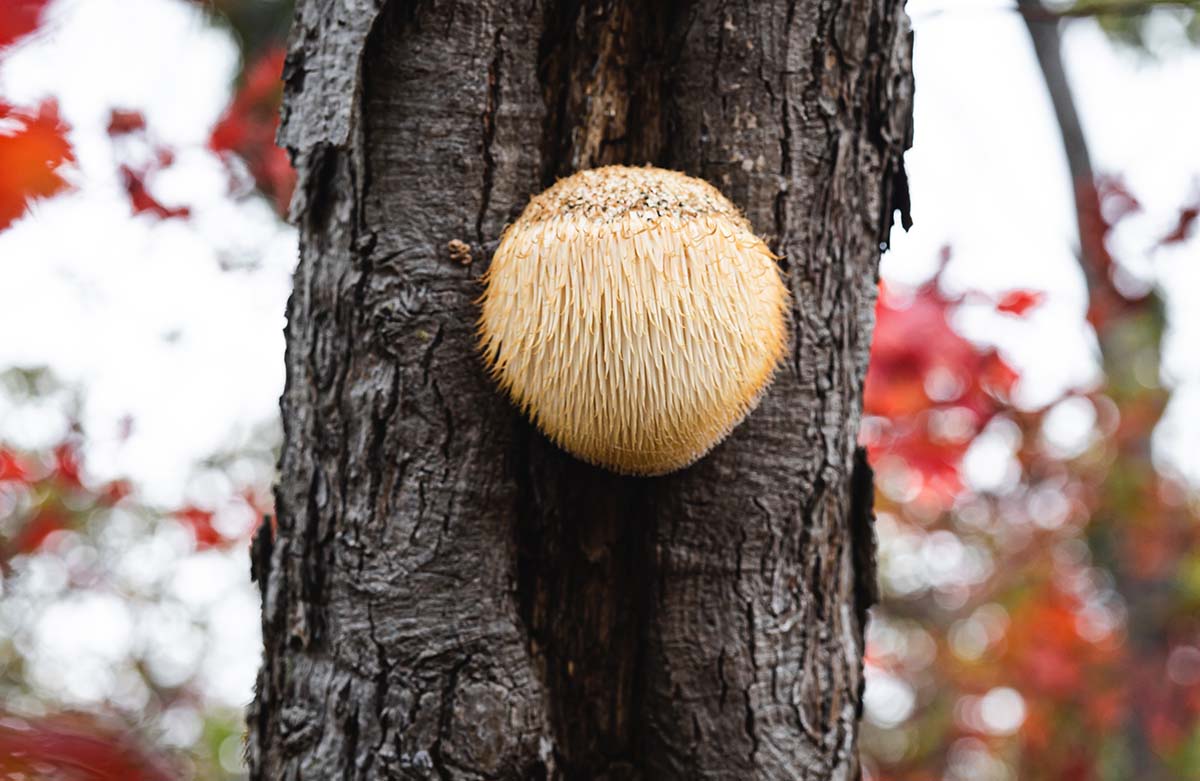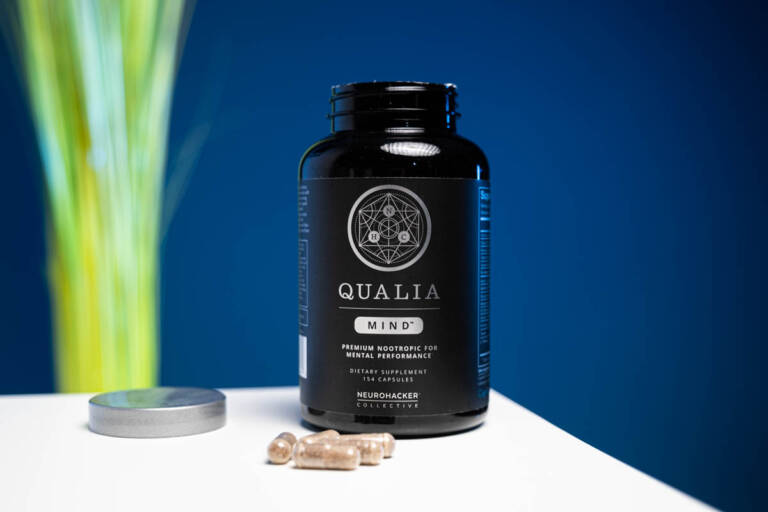Traditional Chinese Medicine hails lion’s mane mushrooms, also known as hericium erinaceus, as one of the best medicinal mushrooms around. But while the health benefits of lion’s mane mushrooms are fairly well known, there is less information about the recommended dosage for using this herbal supplement in the diet. Here we will discuss how much lion’s mane you should use to achieve the results you are expecting.

How Much Lion’s Mane To Take?
Lion’s mane, also known as monkey’s head, promotes the formation of new neurons which is what gives this medicinal mushroom its mental health benefits. It also helps stimulate the production of nerve growth factor which is crucial to neuronal health as it assists the growth, repair, and protection of nerves.
Other purported benefits include boosting the immune system, inhibiting the growth of cancer cells, and reducing the risk of heart disease and blood clots.
However, like other medicinal mushrooms, how much lion’s mane you take will depend on different factors unique to you, such as your age, weight, and the reason for using the mushroom.
As such, the dosage that works for one individual, may not be equally effective for another, so there may be a bit of trial and error involved before identifying the most potent dosage for you.
Lion’s Mane Dosage For Depression
One study investigating the effects of lion’s mane on mild symptoms of anxiety and depression used lion’s mane powder baked into cookies with a concentration of 0.5 grams over a period of four weeks against a placebo control group. Study participants were required to eat 4 cookies a day amounting to two grams daily of the mushroom powder.
After four weeks it was concluded that regular consumption of lion’s mane might reduce mild symptoms of anxiety and depression at that given dosage. [*]
Even though taking lion’s mane will not completely eliminate either anxiety or depressive symptoms, picking a regular dose between 750 to 1000 mg daily can help. This dosage is around the lower end whereas taking up to 5000 mg of lion’s mane mushroom powder has helped some people feel its calming effects.
Lion’s Mane Dosage For Cognitive Function
Both animal and human studies suggest that lion’s mane could potentially help reduce symptoms of mild cognitive impairment and improve overall brain health with the recommendation to take about 1000 mg per day for improving cognitive function.
In one double-blind, placebo-controlled study, participants were given four 250 mg supplements daily for six weeks. The study examined the effects of lion’s mane extracts on mild cognitive impairment with the results showing a significant decrease in related symptoms. [*]
Another more recent study investigated the efficacy of lion’s mane mushroom extract after administering three 350 mg EAHE capsules daily for 49 weeks. Study findings using cognitive tests showed the extract to improve overall cognitive function in individuals with early symptoms of Alzheimer’s disease. [*]
If you do not feel any difference with lower doses, you can start to increase your dosage to experience the mushroom’s benefits on cognitive functioning.
Lion’s Mane Dosage For Sleep Issues
Even though more research is needed, anecdotal evidence suggests that hericium erinaceus may help the treatment of insomnia, sleep apnea, and other sleep-related disorders.
One study administered lion’s mane standardized extract at 1,950 mg for four weeks to assess its effects on sleep quality. Results showed a decline in insomnia symptoms along with a reduction in anxiety, fatigue, irritability, and depression. [*]
Lion’s Mane Dosage For Memory And Focus
People also use hericium erinaceus mushroom extracts for improving brain health in the area of memory, focus, and overall cognitive functioning. Some research suggests that the medicinal mushroom can provide these benefits even when taken at lower dosages.
To improve focus and memory and reduce brain fog, it is recommended to start with a dose of 750 to 1000 mg daily and then gradually build up the dosage.
Lion’s Mane Dosage For ADHD
Some anecdotal evidence suggests that when used in a higher dosage, lion’s mane could be quite beneficial in managing ADHD symptoms. However, current research on hericium erinaceus and ADHD is severely lacking.
If you plan on using lion’s mane mushroom for ADHD, it is best to get professional medical advice especially if you use ADHD prescription medication.
Lion’s Mane Dosage For Neuropathy
Neuropathy is a brain health condition triggered by nerve dysfunction and damage and can be highly painful and disruptive. Some evidence suggests that lion’s mane may alleviate neuropathy by promoting nerve regeneration and neurogenesis.
To reduce neuropathic pain, it is recommended to take around 500 to 1000 mg of lion’s mane one to three times every day. Since the symptoms can vary from one person to the next, the exact dosage will also differ. It’s best to start with a lower dose and experiment until you find the perfect dosage for you.
Typically, hericium erinaceus does not seem to interact with traditional neuropathy medication, so it’s considered safe to use. However, it’s still recommended to consult your doctor before supplementation.
Lion’s Mane Mushroom For MS
There aren’t many published studies specific to hericium erinaceus and MS as research on lion’s mane and neurological conditions is still in its early phases and has mostly used animal models.
However, MS sufferers have reported using doses between 500 and 1500 mg to help manage their debilitating symptoms.
Lion’s Mane Mushroom For Overall Health
Given its ability to regenerate nerves, the lion’s mane may also have some potential in reversing nervous system injuries while repairing brain cells.
One animal study investigated the effects of a lion’s mane on brain injuries caused by an ischemic stroke. Findings showed that brain damage significantly improved in subjects that were administered the lion’s mane supplement compared to others who didn’t receive any supplementation. [*]
As a pick-me-up supplement or natural energy booster, it is important to use the lion’s mane regularly to notice any difference. For overall health maintenance, a daily dose of 250 to 750 mg is considered sufficient for new users.
After seeing how you feel, you can gradually increase the dose if you like and go up to a safe dosage of 1000 mg per day.

How To Take Lion’s Mane?
Lion’s mane products come as capsules, tinctures, tablets, teas, and powder. You can also use fortified foods or include the mushroom in recipes.
-
Of the three options, using a supplement is arguably the easiest way to include lion’s mane into your diet.
-
If you prefer using raw lion’s mane, you can find several recipes that use it as an ingredient including soups, pasta, and stir-fries.
-
For a hassle-free way to include lion’s mane in the diet, there are fortified foods with lion’s mane extracts to consider. Popular options like mushroom coffee, mushroom granola, and mushroom tea are some of the available options.
When To Take Lion’s Mane?
Hericium erinaceus intake is recommended early in the day as it is considered an energizing nootropic. Using lion’s mane supplements later on in the day is typically associated with feelings of restlessness as its adaptogenic properties may act as a natural stimulant.
On the other hand, taking it in the early part of the day will help you feel more alert, focused, and awake.
Is It Safe To Take Lion’s Mane Every Day?
Taking lion’s mane mushroom every day is considered completely safe with no severe side effects reported by healthy adults. The mushroom does not appear harmful unless someone has a pre-existing mushroom allergy.
Dosing, however, varies greatly depending on the potency so make sure not to exceed the dose recommended by the manufacturer.
How Much Lion’s Mane Is Too Much?
Even though lion’s mane is considered relatively safe at high doses, you should not supplement more than 5000 mg of lion’s mane extract. The mushroom is generally considered safe at higher doses with minor side effects such as digestive discomfort including bloating or indigestion.
Research-based data shows that doses of up to 3000 mg daily seemed to present no adverse reactions in healthy individuals. If you don’t have a mushroom allergy, of course.
Also, there is no risk of dependency, addiction or tolerance withdrawal associated with regular use of lion’s mane.
Verdict
Based on the information given above, it’s easy to see that the recommended doses of lion’s mane can vary greatly. A good rule of thumb is to start at a lower dosage than mentioned in studies and use some trial and error to figure out what works best for you.
Click below for the best nootropic stack that contains the lion’s mane mushroom.






